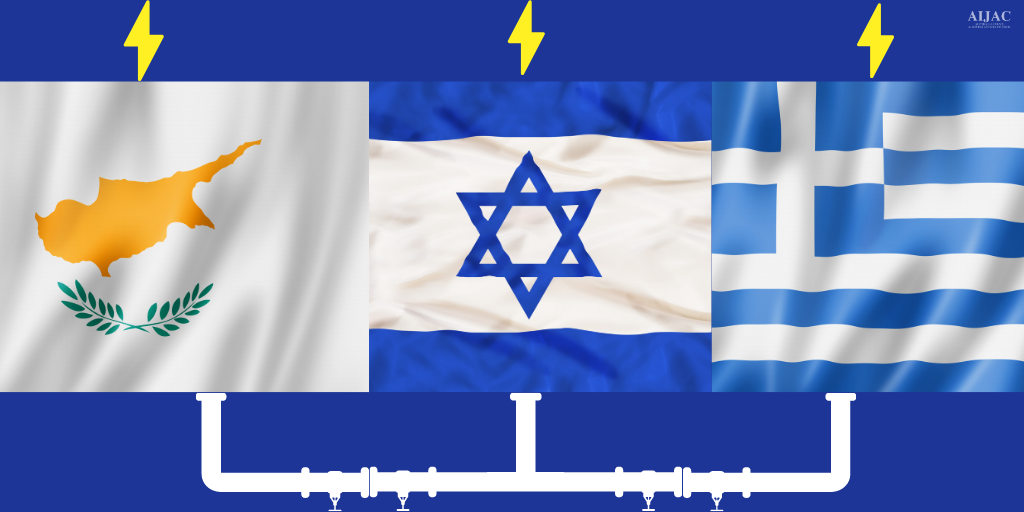FRESH AIR
Israel’s Powerful Connections: The strategic logic behind plans for the world’s longest undersea cable
March 30, 2021 | Oved Lobel

On March 8, the energy ministers of Israel, Greece and Cyprus signed an initial agreement for the construction of, at 1500 km, the world’s longest, deepest undersea power cable. Estimated to cost about 2.5 billion Euros and partly financed by the European Union (EU) as part of its push for energy efficiency and clean energy, the 2,000 megawatt Euro-Asia interconnector project will link the electricity grids of the three countries, as well as hooking Israel and Cyprus up to the European energy grid for the first time. Construction is expected to be complete by 2024 and operational by 2025. The project as conceived would also allow Israel to draw power from Europe’s grid in emergencies and thus rely more heavily on renewables such as solar power, enabling it to meet its climate and energy goals by 2030.
But even more than the positive outcomes for energy security and climate change goals, the project’s political and strategic ramifications are difficult to overstate. Israel’s burgeoning energy and security partnership with Greece and Cyprus, which has qualitatively blossomed since 2017, will further anchor Israel’s importance for Europe and the Middle East.
Alongside the East Mediterranean Gas Forum (EMGF), the result of massive gas discoveries in the Exclusive Economic Zones of Israel, Cyprus and Egypt over the past decade, Israel’s centrality as a security and energy partner is now assured, particularly if the EastMed Pipeline – which would be the longest undersea pipeline in the world, much like the Euro-Asia interconnector – is built, enabling Israel to export natural gas to Europe and linking Cyprus to the EU’s natural gas network.
As AIJAC has covered previously, there are a range of energy and security partnerships now coalescing in the eastern Mediterranean and drawing in a broader range of outside powers. This has accelerated since the signing of the Abraham Accords in 2020, including the United Arab Emirates – which acceded to the EMGF as an observer in late 2020 – as well as the US, France and now Saudi Arabia. Driving this expanding and deepening network of alliances and partnerships is Turkey, which has opted to threaten the key interests of virtually every country in the region and double down whenever challenged. Naturally, Turkey’s reaction to the Euro-Asia interconnector was to demand that Israel, Greece and the EU seek Turkey’s permission to build across what it claims, with no legal basis, is territory within its Economic Exclusion Zone.
The fact that Cyprus, hitherto the only EU member state not connected to Europe’s energy grid, could be fully integrated by 2025 is an explosive problem for Turkey, which has kept the Island divided and occupied since the 1970s, when it established the militarised puppet colony of the Turkish Republic of Northern Cyprus (TRNC). Under the guise of pushing for rights for this puppet state, Turkey has set about trying to sabotage every endeavour of which Cyprus is a part. Recently, Turkey decided to exacerbate tensions yet again by calling for a ‘two-state solution’ to the Cyprus issue, in contravention of universally supported reunification talks, and reportedly puppeteered the election of a presidential candidate in the TRNC more directly under the control of Turkish President Recep Tayyip Erdogan. There is no doubt Turkey will continue using the TRNC as an irritant to undermine the Israel-Greece-Cyprus relationship, normalisation feelers notwithstanding.
Ironically, in its unilateral pursuit to become an energy hub, Turkey has isolated and contained itself, while its competitors gradually become ever more vital for European and Middle Eastern energy needs.
RELATED ARTICLES

Enormous hope that Iran is being liberated: Colin Rubenstein on Sky News

He survived Bondi. Now he’s fighting back: Arsen Ostrovsky addresses AIPAC conference





















